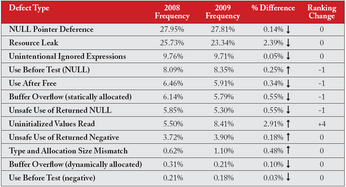Coverity Finds Fewer Defects in Open Source Software
The code analysis specialists Coverity attest to a quality improvement in the open source software they tested.
Coverity investigates code from diverse open source applications in conjunction with the U.S. Department of Homeland Security. The agency sees the investigation and the resulting improvement in quality as important because more and more state agencies are relying on free and open software.
Projects can post a request for analysis on the Coverity website and then provide the source code. Among the projects are Firefox, PHP and Linux itself. Coverity's report reveals that finding around 11,000 defects in 2009 meant a 16% reduction over the last year.

Coverity categorizes the projects into rankings based on the quality of their coce. So far only four projects have achieved the highest ranking, Rung 3, Samba, tor, OpenPAM and Ruby. By Coverity's account, they analyzed over 60 million lines of code since the start of their investigation in 2006. The method they use is static analysis, where the code is read directly for security and performance issues without actually running the app. So it tests not so much how it runs but how the code is structured and how it might lead to a faulty sequence of operations.
The full Coverity report for 2009 is available in PDF format.
Subscribe to our Linux Newsletters
Find Linux and Open Source Jobs
Subscribe to our ADMIN Newsletters
Support Our Work
Linux Magazine content is made possible with support from readers like you. Please consider contributing when you’ve found an article to be beneficial.

News
-
Parrot OS Switches to KDE Plasma Desktop
Yet another distro is making the move to the KDE Plasma desktop.
-
TUXEDO Announces Gemini 17
TUXEDO Computers has released the fourth generation of its Gemini laptop with plenty of updates.
-
Two New Distros Adopt Enlightenment
MX Moksha and AV Linux 25 join ranks with Bodhi Linux and embrace the Enlightenment desktop.
-
Solus Linux 4.8 Removes Python 2
Solus Linux 4.8 has been released with the latest Linux kernel, updated desktops, and a key removal.
-
Zorin OS 18 Hits over a Million Downloads
If you doubt Linux isn't gaining popularity, you only have to look at Zorin OS's download numbers.
-
TUXEDO Computers Scraps Snapdragon X1E-Based Laptop
Due to issues with a Snapdragon CPU, TUXEDO Computers has cancelled its plans to release a laptop based on this elite hardware.
-
Debian Unleashes Debian Libre Live
Debian Libre Live keeps your machine free of proprietary software.
-
Valve Announces Pending Release of Steam Machine
Shout it to the heavens: Steam Machine, powered by Linux, is set to arrive in 2026.
-
Happy Birthday, ADMIN Magazine!
ADMIN is celebrating its 15th anniversary with issue #90.
-
Another Linux Malware Discovered
Russian hackers use Hyper-V to hide malware within Linux virtual machines.
